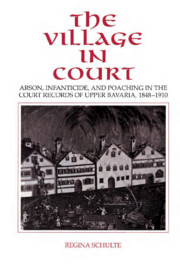 The Village in Court
The Village in Court Book contents
- Frontmatter
- Contents
- Acknowledgments
- Introduction: The breakup of the village
- PART I PEASANT SOCIETY AND THE INDIVIDUAL
- PART II THE STATUS OF WOMEN AND THE PLACE OF CHILDREN
- PART III THE DISPUTED BOUNDARIES OF THE VILLAGE
- 5 Poaching: Economics, culture, and sexuality
- 6 Domination in jeopardy
- Conclusion: On the threshold between two worlds
5 - Poaching: Economics, culture, and sexuality
from PART III - THE DISPUTED BOUNDARIES OF THE VILLAGE
Published online by Cambridge University Press: 04 May 2010
- Frontmatter
- Contents
- Acknowledgments
- Introduction: The breakup of the village
- PART I PEASANT SOCIETY AND THE INDIVIDUAL
- PART II THE STATUS OF WOMEN AND THE PLACE OF CHILDREN
- PART III THE DISPUTED BOUNDARIES OF THE VILLAGE
- 5 Poaching: Economics, culture, and sexuality
- 6 Domination in jeopardy
- Conclusion: On the threshold between two worlds
Summary
Anyone going through the reference works of the Munich State Archives in order to learn a little more about the peasant mentality by exploring the crimes of rural Upper Bavaria may suddenly come across “mobs” and gangs, individuals surrounded by bands of followers. They were all “criminals” because they had engaged in poaching. They had broken the law and shot game, in forests, meadows, mountains, and on their own land or on the preserves of a neighboring landowner – an industrialist from Munich or a rentier, perhaps – but especially on the king's extensive personal domains. Yet most of them could claim to have led respectable lives, as respected farmers with sons and farmhands, day laborers and other villagers of good repute. How was it possible for them to be criminals at the same time? Was there some pathological factor in village society which prompted them – en masse – to forget the game laws from time to time or to ignore them repeatedly?
The peasants' game rights had been stripped away over the centuries. Until the mid-nineteenth century, the poachers were the target of the game laws, and hunting was the right of the gentry, not the farmers. In Bavaria, from the thirteenth century to I February 1849, hunting was the prerogative of the ruler or the state, and since the early Middle Ages game rights had chiefly been a matter of dispute among the feudal lords. With the decline of the power of the estates and the strengthening of princely absolutism, the princes increasingly gained a monopoly on game rights. After 1667, the granting of game rights was a “princely favor.”
- Type
- Chapter
- Information
- The Village in CourtArson, Infanticide, and Poaching in the Court Records of Upper Bavaria 1848–1910, pp. 121 - 177Publisher: Cambridge University PressPrint publication year: 1994
- 1
- Cited by


